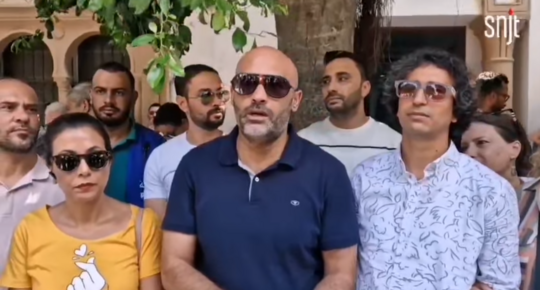
Spain’s Journalists Under Digital Siege: IPI Sounds Alarm on Online Intimidation
August 26, 2024
Bangladesh Journalist Couple Arrested at Airport Amid Student Protest Probe
August 27, 2024August 26, 2024 – Tunisia –
The Court of First Instance of Tunis 1 provisionally upheld its earlier in‑absentia verdict against Walid Al‑Majri, director of the investigative news site Al‑Katiba, following his appeal. Al‑Majri was originally sentenced in January 2023 to one year in prison for “insulting” former President Béji Caïd Essebsi and the Interior Minister via Facebook posts—a conviction widely regarded as politically motivated.
His initial trial, based on a 2017 complaint by the Interior Ministry, was conducted without his presence or official summons, raising serious concerns over due process. The appeal hearing has been delayed, but in a positive interim step, the court allowed him to remain free pending the outcome.
The International Federation of Journalists (IFJ), alongside the Syndicat National des Journalistes Tunisiens (SNJT), has demanded that Tunisian authorities annul Al‑Majri’s sentence entirely. They argue it violates both Tunisia’s constitutional protections for free expression (Articles 37 and 38) and international standards such as the International Covenant on Civil and Political Rights.
ARTICLE 19, a global watchdog, has similarly called for the court to exercise its authority to cancel the in‑absentia judgement, highlighting that such rulings undermine not only freedom of speech but also Tunisia’s fragile legal norms.
The SNJT amplified its protest via a solidarity sit‑in on 22 August. General Secretary Ziad Dabbar warned against Tunisia’s “restrictive laws and absurd practices,” including the troubling use of Decree‑Law 54 (2022) targeting online speech, and pledged escalatory measures—up to general strike action or international litigation—if the case is not resolved fairly.
This case illustrates a broader deterioration in press freedoms within Tunisia, where legal mechanisms are increasingly employed to silence dissent. Human Rights Watch notes that multiple journalists have faced detention, conviction, or harassment under similar legislation, including Decree‑Law 54 and counterterrorism statutes.
Al‑Majri’s appeal will be a litmus test for Tunisia’s commitment to press freedom and judicial independence. Overturning the in‑absentia conviction would reinforce journalists’ rights and demonstrate that procedural fairness and free expression are upheld in the country’s evolving democratic framework.
Reference –
Tunisia: IFJ and SNJT call for judgement against journalist Walid Al-Majri to be annulled – IFJ




